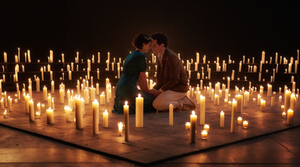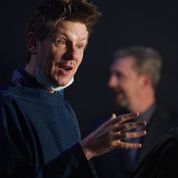Guest Blog: Simon Godwin on Birthing Shakespeare's Verona Afresh on Film
The Director On How He Shifted His National Theatre 'Romeo & Juliet' from Stage to Screen

As an associate director of The National Theatre and Artistic Director of the Shakespeare Theatre Company in Washington DC, Simon Godwin knows his way around a Shakespeare text. Among his National credits are memorable productions of Twelfth Night, starring Tamsin Greig, and Antony and Cleopatra, which won Evening Standard Theatre Awards for both Ralph Fiennes and Sophie Okonedo. But when the pandemic hit, plans for a major revival in the Olivier auditorium of Romeo and Juliet, starring Josh O'Connor and Jessie Buckley, had to shift gears, and fast. Below, Godwin describes what it was like to refashion his production for the screen, thereby marking his debut as a filmmaker in the process.
During the last few months, I have become a fledgling filmmaker.
Last summer, I was due to direct a modern dress Romeo and Juliet on the Olivier stage of The National Theatre. When it was canceled due to the pandemic, we asked ourselves how we could still tell this story. The answer lay in turning the Lyttelton Theatre into a film studio. Beginning with the haunting, empty theatre space, we explored the power of illusion and imagination, blurring the lines between rehearsal, staged production, and film.

Our story begins with actors arriving to rehearse a play without an audience. They perform for themselves, in a ritual of solidarity. As the first fight breaks out between the feuding families, a stick becomes a weapon. As the struggle swells, the stick becomes a knife, moving from representation to reality. As the story unfolds and the characters' imagination takes hold, Verona emerges ever more vividly. At the Capulets' ball, Romeo and Juliet meet at the party in their costumes: when they touch, they meet as strangers, actors in their first rehearsal.
During the four weeks of rehearsals, early every morning I had a crash course in film-making with our cinematographer, Tim Sidell. Tim taught me the basics of cinematic language. When directing for the stage, I think of the actors' physical presence, their choreography, their blocking; I make sure they can be seen, heard, and understood from any seat in the house. Now I began to see the world differently, playing with camera angles and close-ups and gaining a new access to characters' thoughts and feelings. The process became a sharing of expertise and experiences between the worlds of theatre and screen.
When we fall in love we oscillate between a heightened state of fantasy and a sense of our most authentic selves, then back to fantasy, then back to the super real. As we explored together levels of storytelling and representation, we realized that we had stumbled on a metaphor for love. Love is unstable. Love transports us across time and space. Love is anchored in dreams as much in reality. In the play, characters re-fashion their language to express their desire.
The unique circumstances of our own conception meant that we were able to weave a new language of theatre and film to reflect Romeo and Juliet's unique passion, tragically transient yet never to be forgotten. We simultaneously created a play shot on camera and a film that never leaves the stage.
Romeo & Juliet will air on Sky Arts on 4, 5, and 8 April at 9pm and on PBS in the US on 23 April.
Main image of Jessie Buckley and Josh O'Connor c. Rob Youngson
Comments
Videos

